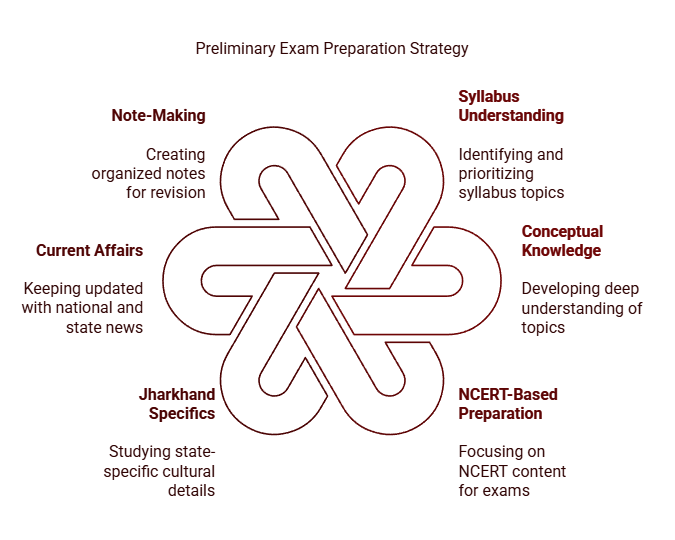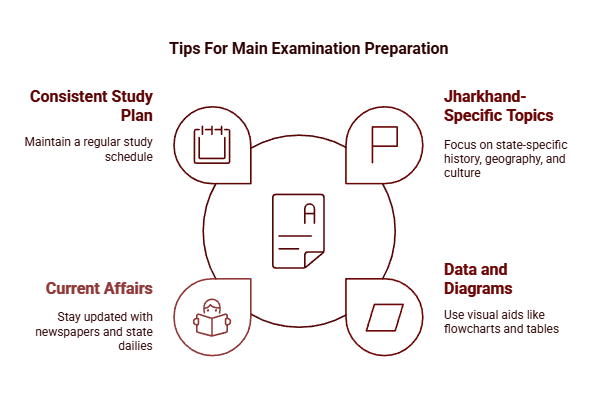Jharkhand
Jharkhand Public Service Commission (JPSC) Strategy
- 24 Feb 2025
- 12 min read
What is the Need for Strategy?
To succeed in the Jharkhand Combined Civil Services Examination, it is essential to devise a proper and dynamic strategy tailored to its specific requirements.
The JPSC examination is conducted in three stages: Preliminary, Mains, and Interview. Progression to each subsequent stage requires successfully clearing the previous one. Since the nature of these stages varies significantly, it is crucial to adopt a distinct and focused strategy for each to ensure success at every level.
Preliminary Exam Strategy
Overview
- General Studies-I focuses on broad topics, including history, geography, polity, economics, and science. It requires conceptual and factual clarity.
- General Studies-II paper emphasizes Jharkhand’s history, unique identity, culture, literature, movements, laws, governance, and other state-specific aspects.
Step-by-Step Strategy for Preparation
- Thorough Understanding of the Syllabus:
- Begin by studying the syllabus carefully. Identify all the parts and aspects of the syllabus and prioritize topics based on your convenience and interest.
- Understand the trend of questions by analyzing the previous 5–10 years' question papers and focus on topics frequently asked.
- Develop Conceptual and Factual Knowledge:
- A deep understanding of specific sections is crucial, as many questions are based on both conceptual clarity and factual details.
- For example:
- Who is referred to as Andhra Bhoja?
- What is the term for the village head in Santhal communities?
- Prepare short, concise notes on such factual details for regular revision.
- NCERT-Based Preparation:
- Many questions in this exam are sourced from NCERT books. Studying NCERT books thoroughly for general studies is highly beneficial.
- Specific Preparation for Jharkhand:
- Compile lists related to major tribal communities, their festivals, cultural practices, and other state-specific details.
- For instance, to answer questions like “What is the name of the festival of flowers of the tribals in Jharkhand?”, prepare a comprehensive list of tribal festivals and their significance.
- Use books published by the Jharkhand Publication Department and other standard resources for Jharkhand’s general knowledge.
- Current Affairs:
- Current events, both national and state-specific, form an integral part of the exam. Regularly follow newspapers such as The Hindu and Indian Express.
- Additionally, utilize resources like Drishti Current Affairs Today magazine, Drishti PCS website and other reliable sources for daily updates.
- Note down key developments, plans, and programs related to Jharkhand.
- Comprehensive Note-Making:
- Create point-wise notes for every topic, especially for sections like history, culture, law, sports, and governance.
- Organize your notes in a way that allows quick revision before the exam.
- Practice and Time Management:
- Solve practice papers and previous years’ question papers within the prescribed time limit, especially 15–20 days before the exam.
- This exercise not only helps develop a better understanding of the exam pattern but also familiarizes candidates with repetitive questions and improves speed.
- Attempting the Exam:
- Utilize the absence of negative marking by attempting all questions, including the ones you are unsure of, using logical guesswork.
- Focus on accuracy while answering, but don’t leave any questions unanswered.
Key Tips for the General Knowledge of Jharkhand
- The syllabus for the General Knowledge of Jharkhand paper is divided into topics such as the history, movement, culture, literature, governance, institutions, and laws of the state.
- Candidates should regularly update their knowledge of state-level events, schemes, and programs using newspapers, state-specific books, and online resources.
- Referring to state-specific news on reliable sources like Drishti PCS is also beneficial.
Final Preparation
- In the final stages of preparation, focus on revising your notes, solving mock tests, and enhancing your ability to recall factual information quickly. By maintaining consistent study habits, practicing effectively, and leveraging available resources, you can significantly enhance your chances of success in the JPSC Preliminary Examination.
Mains Exam Strategy
The preparation strategy for the main exam differs significantly from that of the Preliminary Examination due to the distinct nature of the two stages. While the Preliminary Examination is objective and qualifying in nature, the Main Examination is descriptive, and the marks obtained in this stage are included in the final merit list.
Therefore, the Mains Examination holds immense importance and plays a critical role in determining success in the final selection process.
- Understand the Exam Pattern and Syllabus
- Familiarize yourself with the syllabus and exam structure. Each paper requires a distinct approach, so break down your preparation accordingly.
- Prioritize topics based on their weightage and difficulty level.
- General Tips for All Papers
- Time Management: Allocate fixed hours daily for each paper.
- Answer Writing Practice: Focus on improving writing skills by practicing at least 2–3 answers daily. Stick to the word limit and structure your answers with an introduction, body, and conclusion.
- Revision: Regular revision is critical. Use concise notes to revise important facts, concepts, and examples.
- Mock Tests: Attempt full-length mock tests under timed conditions to build confidence and identify weak areas.
Paper-Wise Strategy
- Paper-I: General Hindi & General English (Qualifying)
- Focus on grammar, essay writing, précis, and comprehension.
- Use standard grammar books like Wren & Martin for English and relevant Hindi grammar guides.
- Practice writing essays and précis regularly in both languages.
- Paper-II: Language and Literature
- Choose a language or literature subject you are comfortable with or have prior knowledge of.
- Study the syllabus and focus on literary history, prose, poetry, and notable authors/works.
- Write short summaries of key literary texts and practice answering descriptive questions.
- Paper-III: Social Sciences (History & Geography)
- History
- Divide the preparation into ancient, medieval, and modern history.
- Focus on Jharkhand-specific historical events like tribal revolts and movements.
- Use NCERT books and Jharkhand-specific history materials for reference.
- Geography
- Focus on physical, economic, and human geography with special emphasis on Jharkhand’s geography (e.g., minerals, climate, forests).
- Practice map-based questions and diagrams.
- Refer to NCERTs and a Jharkhand-specific geography book.
- History
- Paper-IV: Indian Constitution & Polity, Public Administration & Good Governance
- Indian Constitution & Polity
- Focus on key constitutional provisions, governance structures, and amendments.
- Study contemporary issues like federalism, judicial reforms, and Panchayati Raj Institutions in Jharkhand.
- Refer to M. Laxmikanth’s Indian Polity.
- Public Administration & Good Governance
- Study administrative reforms, ethics, and governance challenges, particularly in Jharkhand.
- Relate examples of good governance initiatives from Jharkhand and India.
- Indian Constitution & Polity
- Paper-V: Indian Economy, Globalization & Sustainable Development
- Focus on Indian economy basics, current economic challenges, and globalization's impact on India.
- Study Jharkhand’s economic policies, industries, agriculture, and developmental challenges.
- Use reports like the Economic Survey and Budget for up-to-date data.
- Learn about sustainable development practices with examples from Jharkhand.
- Paper-VI: General Sciences, Environment & Technology Development
- General Sciences: Focus on fundamental concepts in physics, chemistry, and biology from NCERT books.
- Environment: Study environmental issues, climate change, biodiversity, and Jharkhand’s environmental challenges like mining impacts and forest conservation.
- Technology Development: Focus on emerging technologies, IT, space, and their applications in governance.
Interview Strategy
- Understand the Objective:
- The interview focuses on testing your mental alertness, communication skills, and clarity of thought, along with your understanding of socio-economic and administrative issues.
- Revise Key Topics:
- Current Affairs: Stay updated on national, international, and Jharkhand-specific news.
- State Knowledge: Focus on Jharkhand’s history, culture, governance, and current developments.
- Prepare for Personal Questions:
- Be ready to answer questions about your hobbies, strengths, weaknesses, and reasons for choosing civil services.
- Know your DAF (Detailed Application Form) thoroughly and anticipate questions related to it.
- Mock Interviews:
- Attend mock interviews to gain confidence and receive constructive feedback.
- Simulate the interview environment to improve body language and time management.
- Ethical and Administrative Scenarios:
- Prepare to answer situational questions that test your problem-solving and decision-making abilities.
- Time Management:
- Practice answering within a reasonable time while covering key points.
Conclusion
To excel in the Jharkhand Combined Civil Services Examination, it is essential to adopt a focused strategy for each stage. A consistent and methodical preparation strategy, combined with regular revision and practice, will significantly enhance the chances of success in this examination.

.jpg)





